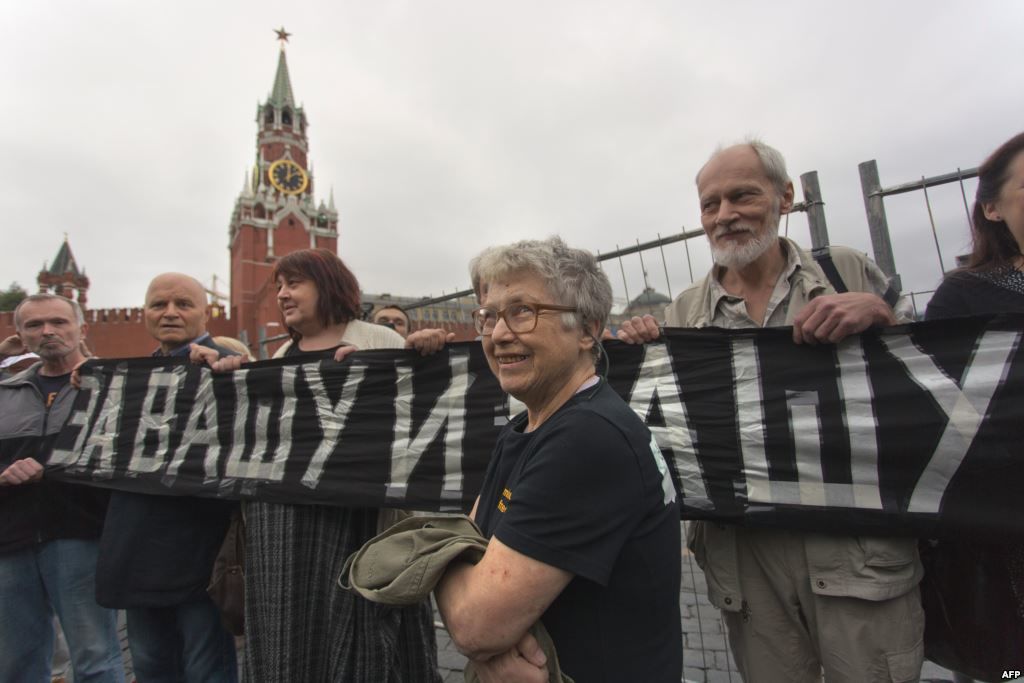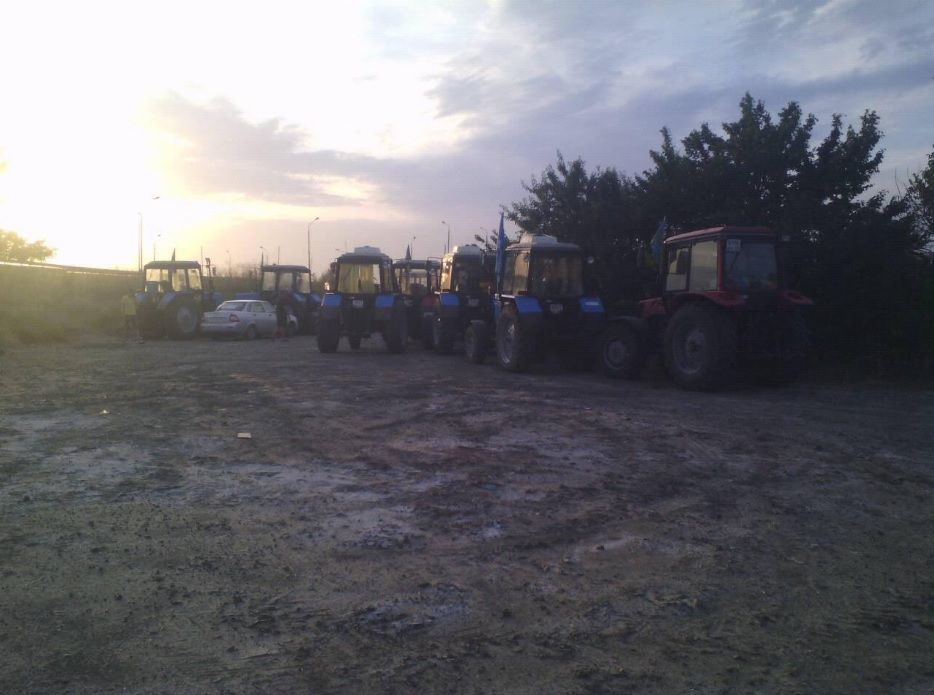LIVE UPDATES: Kuban farmers who protested the illegal seizure of their land in a tractor convoy were fined or jailed, and truck drivers who joined them in solidarity were beaten and arrested.
Welcome to our column, Russia Update, where we will be closely following day-to-day developments in Russia, including the Russian government’s foreign and domestic policies.
The previous issue is here.
Recent Analysis and Translations:
– The Kremlin is Working Hard to Make Donald Trump President
– Russian Elections Round-Up: Parnas List Accepted; Party of Pensioners Forced to Remove Candidates
– ‘What Would Boris Do?†Opposition Struggles with In-Fighting on Eve of September Elections
– NATO Got Nothing From Conceding To Russia In the Past, Why Should It Cave To The Kremlin Now?
UPDATES BELOW

Today, August 25, is the 48th anniversary of the demonstration in Red Square by eight Russian dissidents who opposed the Soviet invasion of Czechoslovakia. They carried a flag with the slogan: “For Our Freedom and Yours,” popularized by the Polish freedom movement. All of them were arrested that day or some months later.
But today, four young people who assembled at the same place, the Lobnoye Mesto, a semi-circular platform on Red Square, sought to commemorate their action using the same flag, they were quickly detained. Irina Yatsenko, Olga Sonina, Igor Klochkov and Viktor Kapitonov are currently held in the Kitay-Gorod Police Precinct.
These detentions and many others recently contribute to a feeling that it’s “back to the USSR” in Russia under President Vladimir Putin, where increasing numbers of arrests, police beatings, and heavy labor colony sentences are curbing whatever dissent is mustered against Putin’s authoritarian regime.
These last few days have seen detentions of opposition candidates to the State Duma as well as environmental, and labor activists and the trials of a Leninist as well as a nationalist critical of Putin.
o Farmers Outraged at Land Confiscations Try to March on Moscow
As we reported, farmers who tried to drive their tractors all the way to Moscow from Krasnodar Territory were stopped in Rostov Region and ultimately arrested by riot police and fined or given 10-day jail terms. Truck drivers who rallied in their support were beaten and also handed 10-day sentences and fines.
Today, the farmers were reluctantly forced to head home to avoid further harassment, RBC reported.
Aleksei Volchenko, leader of the farmers’ protest, said:
“At this stage the action has simply been broken up and beaten, in fact quite brutally, but I think we have very loudly made a statement about our problems.”
He said the deputy chief of police for Rostov Region filled up the gas tanks of all the tractors himself and saw them off to make sure they headed home.
o Opposition Candidates Detained in St. Petersburg
Yesterday, August 24, a group of activists in St. Petersburg got together to meet alternative candidates they supported, but soon found themselves detained by police.
Among those detained were Andrei Pivovarov, a candidate for the State Duma who already has a suspended sentence from last year; Daniil Ken, candidate for the St. Petersburg Legislature; Mikhail Novitsky, a well-known singer; and Vladimir Kara-Murza, Jr., program coordinator for Open Russia, the movement founded by businessman and former political prisoner Mikhail Khodorkovsky.
Open Russia is supporting the candidates.
Translation: Vladimir @vkaramurza Kara-Murza greeted us from the window, but Daniil @daniilken Ken was released without a police report.
The activists were held until late at night, then released after being charged under Art. 20 of the Administrative Code for an “unauthorized rally.”
In a blog post about the incident, Kara-Murza, Jr. said that not only the local St. Petersburg police were involved in their detention but so was a staff officer of the “E” Center, as the Interior Ministry’s Anti-Extremism Center in Moscow is known.
Ekho Moskvy asked why the police were bothering to break up a meeting that at most would have had only a few dozen people at it, and thus call more attention to it. Kara-Murza replied that all over Russia, events organized by Open Russia have been disrupted but there isn’t any logic except “to drag ’em in and not let ’em through,” in the words of the policeman in the 1868 short story by Gleb Uspensky, “The Booth,” often recalled by Russians to signify police abuse.
o Russian Authorities Seize Property of Anti-Doping Whistle-Blower
In a separate case, authorities have seized the property of Grigory Rodchenkov, the former head of the Moscow anti-doping laboratory who blew the whistle on the FSB’s tampering with athletes’ urine samples, Interfax reported. His property mainly consisted of a land parcel.
Rodchenkov fled to the US earlier this year, fearing for his life after other officials who criticized the anti-doping practices died. Russia’s Investigative Committee (IC) has inquired of US authorities where Rodchenkov is living, and has tried to smear him, accusing him of selling medications acquired in the US which are prohibited in Russia, and other schemes.
o Court Declines Petition to Place Leftist Activist Charged with “Incitement of Hatred” Under House Arrest
The Lenin District Court in the city of Ulyanovsk declined a petition from prosecutors to place a local Left Bloc activist, Daniil Alfyorov, accused of “extremism,” under house arrest.
On August 22, Alfyorov was detained during a search of the apartment in Moscow where he was staying. The search was in connection with a case opened nearly two years ago on November 7, 2014 regarding an authorized demonstration of the Communist Party of the Russian Federation.
The Communists organized a march through Ulyanovsk with the flags of the USSR, KPRF, and Lenin Komsomol and chanted “All Power to the Soviets!” “Glory to Great Lenin!” and “Stand Up, Great Country!”, all slogans from the Soviet era.
The march culminated in a rally where Alfyorov gave a brief speech which later authorities characterized as “inciting hatred against a social group,” namely the government. The Saratov Bureau for Forensic Research conducted a psychological and linguistic analysis of the text of Alfyorov’s speech and confirmed the investigators’ characterization.
The judge rejected the appeal to arrest him not because he found the entire thing ludicrous, but because Alfyorov did not have a previous criminal record, had positive character evaluations and was evidently not a flight risk despite having travelled to Moscow, thus accepting Alfyorov’s explanation that he did not know the case was still open.
Alfyorov signed a pledge not to leave Ulyanovsk and is now awaiting trial. A historian by training, he has in the past held solo pickets in defense of the long-distance truck drivers; in support of political prisoners; and against the Yarovaya anti-terrorism legislation.
o Nationalist Activist Potkin, Organizer of ‘Russians’ March, Sentenced to 7.5 Years for Money-Laundering
Nationalist activist Aleksandr Potkin (who used the last name “Belov”) was sentenced on August 24 to 7.5 years of standard-regime labor colony on charges of laundering money from the Kazakh BTA Bank; making calls for extremist activity; inciting hatred and enmity; and organizing an extremist association, Novaya Gazeta reported. He was also ordered to pay a fine of 600,000 rubles (US $927).
The prosecution had asked for 9 years, and a plaintiff from BTA bank had asked for a sum of nearly 5 billion rubles (US $72 million).
The charges involving the Kazakh bank relate to Potkin’s association with Mukhtar Ablyazov, the former energy minister of Kazakhstan who fled to the west, saying he was a victim of political oppression, but who was ultimately arrested by authorities in France for embezzlement and is now awaiting extradition.
Russian prosecutors said Ablyazov wanted to involve Potkin in a Russian group in Kazakhstan that would destabilize the political situation there, exacerbating tensions between Kazakh nationalists and Russians and Russian-speakers. Paul Goble, our syndicated columnist, has asked whether the case was concocted by Kazakh authorities for their own political purposes.
Alexey Navalny, the anti-corruption activist, a one-time close associate of Belov, also believes the case was fabricated, but for different reasons, and by Russia.
Belov, the organizer of the annual nationalist “Russians” marches, was a supporter of Navalny, and for that reason, Navalny attended the marches for some years, sparking criticism of liberals who saw him pandering to nationalists. At one point the court summoned Navalny as a witness in Belov’s case.
Navalny believes that the Kremlin selected Belov for prosecution not only because of his support of him but because while a nationalist, he was critical of Putin.
“Belov and his comrades consistently spoke for uniting the forces of nationalists and liberals. The Kremlin wanted that least of all,” wrote Navalny in a blog post.
o Environmentalist Charged with ‘Incitement of Hatred’ Toward Nuclear Plant Workers
Greenpeace Russia reports that Fyodor Maryasov, an activist in Krasnoyarsky Territory, has been accused of “inciting hatred toward a social group,” in this case workers at a nuclear plant, Chronicle of Current Events reports.
Maryasov wrote on his VKontakte page on August 18 that two FSB agents came with a warrant to search his apartment. They seized his computer hard drive as well as a report he had printed out from Rosatom, the state nuclear agency.
He was then taken for interrogation to the FSB building in Zheleznogorsk and held for three hours, then released pending trial. The FSB made the charges of “incitement of hatred” based on linguistic analysis of Maryasov’s posts on VKontakte over several years.
Maryasov believes the case was opened due to his criticism of Rosatom’s plans for building a nuclear waste facility in Zheleznogorsk, 50 kilometers from Krasnoyarsk, which has a population of one million. He says he has evidence of a number of violations of law related to the project.
Maryasov also launched an appeal, already signed by 80,000 people, urging that plans for the nuclear waste facility be cancelled.
— Catherine A. Fitzpatrick

Translation: This is Sergei Aksaysky, long-distance truck driver. He supported the march of the farmers. For his solidarity he got 10 days in jail.
(The tweet has a mistake; Aksaysky is the name of the town where Sergei was tried in court, Grani.ru reported; his last name is in fact “Vladimirov” and he is originally from St. Petersburg.)
Likely the authorities decided to punish the truck drivers, an older and larger movement, more than the farmers, who have just begun their protests, so as to discourage further solidarity of this type among labor groups.
The regional prosecutor’s office is investigating the farmers to determine if further charges should be brought for their mass action; meanwhile, prosecutors refuse to investigate the illegal seizures of land by corrupt officials which sparked the farmers’ protest in the first place, Rostovskiye Novosti (Rostov News) reports.
A local news video shows the protest drives of both the farmers and the truck drivers. (The video is incorrectly labelled that the farmers driving tractors were beaten; it was the truck drivers who were beaten.)
When Golubev arrived, however, Yelena Kostyuchenko and Anna Artyomova, two Novaya Gazeta reporters who went to cover the meeting with the striking coal miners were blocked from attending.
Although Russian press law provides for the right of journalists to cover such meetings, the governor’s press secretary said the reporters were not accredited and had not been vetted by security.
“Do you need freedom of speech or your wages?” asked Viktor Gorenko, mayor of Gukovo, who also attended.
Ultimately the reporters persuaded the miners to take part in the meeting. They had to sit outside the meeting but as Golubev departed, Kostyuchenko got a comment from him that “the law is on the side of the miners” and that he was “working on” getting their wages paid.
— Catherine A. Fitzpatrick




